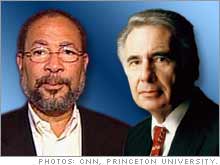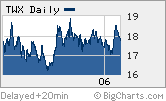|
Time for Time Warner to move on
Carl Icahn and Dick Parsons have kissed and made up. So what's next for the struggling stock?
NEW YORK (CNNMoney.com) � Now that Carl Icahn has abandoned his attempt to take over control of Time Warner, investors must be wondering what is next for the beaten down shares of the media giant. Time Warner and the activist shareholder settled their differences Friday. As part of their agreement, Time Warner will boost its stock buyback plan to $20 billion, cut $1 billion in costs by the end of 2007 and nominate two independent directors to its board.
Icahn, in turn, is giving up his plan to nominate his own slate of directors at the company's next shareholder meeting. Icahn had led a group of investors that owned about 6 percent of Time Warner's stock and options which sought to break up the company into four pieces. (Time Warner is the parent company of CNNMoney.com.) The settlement news helped lift shares of Time Warner (Research) slightly after the opening bell Tuesday but the stock gave up those gains by late morning. And shares are still down more than 8 percent since the end of 2004 as shares of all traditional media companies remain out of favor on Wall Street due to concerns about sluggish growth prospects. Back to business
Greg Gorbatenko, an analyst with Jackson Securities, said the settlement is a big positive for the company since it will allow CEO Dick Parsons to remain focused on improving the operating performance at the company, as opposed to fighting a contentious proxy battle. Gorbatenko said Parsons deserves particular praise for the steps he has taken with the company's AOL division, which includes an online content site and an Internet access business. While the Internet access side of the business has steadily lost subscribers, AOL.com has won praise from analysts and consumers during the past year as the site began to offer content free to all Web users, a move that enabled AOL to cash in on the booming demand for online advertising. In December, Time Warner agreed to sell a 5 percent stake in AOL to Google for $1 billion. "Over time, I think Parsons will unlock more value, especially with AOL. I think Parsons has the right strategy. He needs time to do his job rather than fight everyone off," said Gorbatenko. Robin Diedrich, an analyst with Edward Jones, agreed that the settlement is positive since it ends concerns about whether or not a new management team may be coming in and will enable Parsons to stick with the status quo. "Anytime you can get some certainty to the story, it's a good thing for investors," she said. "It's good for the company to focus on operations. Time Warner has been looking to maximize value and make small deals, like selling the book business. They are moving in the right direction." Time Warner announced a deal to sell its book unit to French company Lagardere earlier this month. The increased buyback was also hailed by analysts since stock repurchases tend to boost earnings per share by reducing the available share count. Still, some investors may be perturbed by the fact that Time Warner is going to need to add on more debt in order to pay for the buyback program. Gorbatenko said investors should not be concerned though since the company did a good job of reducing debt over the past few years and has room to add more. He also points out that buyback will take place over time. "The increased debt is not worrisome," Gorbatenko said. "Time Warner is not likely to see its debt dropping in investment grade or credit quality. It's not as if all the buybacks are going to happen tomorrow." Joe Bonner, an analyst with Argus Research, agreed that the added debt burden should not be a major problem for the company but he said that it may be difficult for Time Warner to finance any deals in the next year or so because of the increase in the share repurchase program. "The negative is that there could be an acquisition in the future they'd have a problem with," Bonner said. Spanish language broadcaster Univision has recently put itself up for sale and Time Warner is said to be among one of many media firms interested in Univision. Pull the plug on cable?
Some remain unconvinced that Time Warner's stock can bounce back until it becomes clear what the company plans to do with its cable division. Icahn argued that Time Warner Cable should be spun-off in its entirety while Dick Parsons maintained that the company should only sell a minority stake to the public. But as part of Friday's settlement, the company did say that "a different capital and corporate structure may be appropriate for Time Warner Cable in the future so long as it provides strategic flexibility with the company's content businesses." Analysts interpreted that to mean that Time Warner may sell a larger stake in Time Warner than it had originally planned. Richard Greenfield, an analyst with Pali Research, said that Time Warner's stock may remain stuck in a narrow range until the company issues a firm plan for what it wants to do with its cable business. Greenfield thinks that a full cable spin-off makes sense since that would allow investors to make a choice as to whether or not they want to buy a pure play entertainment company or a cable firm. "Without a doubt there is an increasing split between investors who believe in distribution versus those who believe in content," said Greenfield. But Gorbatenko said that the cable business is still a good fit with Time Warner's more traditional media assets and noted that other cable firms such as Comcast and Cablevision also own programming in addition to cable distribution assets. Media malaise lingers
Few would deny that Time Warner's stock is cheap. Shares trade at about 8.6 times 2006 estimated earnings before interest, taxes, depreciation, and amortization (EBITDA) basis. EBITDA is a commonly used metric for valuing media companies. Then again, many analysts think the whole sector is attractively valued. At this level, Time Warner trades about in-line with Comcast (Research) and a slight discount to Cablevision (Research) as well as media rivals Viacom (Research), News Corp (Research). and Walt Disney (Research). So Bonner said that the buyback and overall settlement does not change much for Time Warner's fundamentals since it and media rivals still are plagued by doubters on Wall Street who think these companies are losing ground to upstarts like Apple, Google and Yahoo! "There is this industry-wide issue about what will happen with traditional media versus digital media. That issue is not, by any means, solved," he said. Diedrich agreed with that assessment and said that as long as the negative sentiment persists, it's impossible to predict when Time Warner, or any other media stock for that matter, will recover. "The whole media sector is somewhat under a cloud for a variety of reasons," she said. "I think there is some room for stocks to improve. When's that going to be? I wish I knew." For more about Time Warner's settlement with Icahn, click here. For a look at why many big Time Warner shareholders balked at Icahn's breakup plan, click here. Analysts quoted in this story do not own shares of the companies mentioned and their firms have no investment banking ties with the companies.
The reporter of this story owns shares of Time Warner through his company's 401(k) plan. |
| |||||||||||||||||||||||||||||||||||||||||||||||||||||||||||||||||||||||||||||||||||||||||||||||||||



